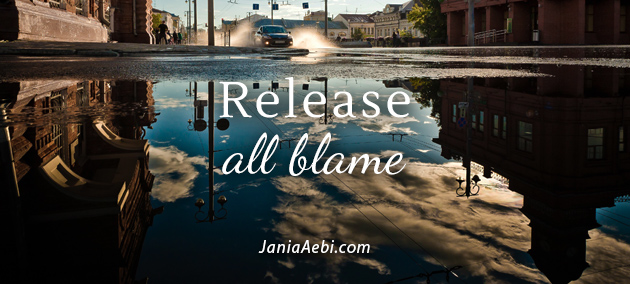It was a rainy day, very cold, and I was walking to my bus stop. 100 meters away I could see a billboard with blue seas, brilliant sunshine and palm trees on a golden beach, well-worth stopping to look at with longing. Actually, there was someone right in front of it, obviously wishing they were there, instead of here.
He started walking again before I got there, and a car passed me; as it got to his level, there must have been a big puddle, so a spray of muddy water shot out, right at him. He turned towards the car – which was already way past him – obviously angry and almost shook his fist at it. I could hear him exclaiming, even if I was too far to hear what he said.
Accidents happen all the time, and this was one of them. It made me conscious of the reactions people have, which only serve to make them angry and unhappy, and don’t inconvenience the other person at all. I could imagine what he was shouting; “You stupid idiot! Didn’t you see me?!” That’s a knee-jerk reaction; it doesn’t make anything better, and ruined his day.
That reaction stemmed from judgment and blame, and what’s more, wasn’t even truthful, or accurate: the driver may not have seen him, because of the rain and being focused on the road, and he couldn’t be a stupid idiot or he would have been in an institution, not driving his car. He may not have been aware of the puddle, either.
A far more conscious reaction might have been: “I just got splashed with mud! I’ll have some cleaning up to do!” That acknowledges a fact, but eliminates both blaming someone for what has happened and the judgment, which was untrue. As a bonus, your feelings are at peace and your day is not ruined.
Because no one is ever responsible for your feelings; they are already stored within you, unnoticed, until some circumstance brings them to the surface so they can be expressed and move out. When you blame people, you are linking an effect with a cause, which is not the truth, because they are two separate things that have happened at the same time.
The anger the person I saw was in him already and got triggered by a random event – it could have been triggered by a world-leader’s speech on TV – and the belief he had the driver was the cause of his anger was only his belief, not shared by me, as an onlooker, and not necessarily true.
So the important thing, whenever you are triggered, is to try and find another perspective, one where you could step out of being a victim; and it’s not about denying anything, because your circumstances are real, and your feelings are real, but circumstances don’t cause your feelings or your thoughts; they are independent of one another, until you link them together.
Try being grateful for the trigger, which allowed your angry, resentful or sad feelings to be dissipated without damage to anyone else – and see how much happier you will be.
